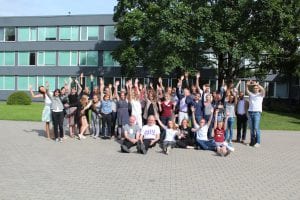[vc_row][vc_column][vc_column_text]by Ancel.la Santos Quintano, Policy Advisor, Health Action International
A strong civil society is an essential component of an advanced democracy. To facilitate participation in policy-making processes, civil society groups need capacity and expertise. In July 2016, Health Action International (HAI) and Health Projects for Latvia organised a four-day summer school in the charming city of Riga, Latvia, to strengthen the capacity of university students interested in public health issues to engage in discussions about access to medicines in Europe and their rational use.[/vc_column_text][/vc_column][/vc_row][vc_row][vc_column][vc_column_text css=”.vc_custom_1487671815373{padding-top: -30px !important;padding-bottom: -30px !important;}”]

A total of 30 highly motivated students from all over Europe attended the course. The vast majority of the participants (21) came from Latvia, Estonia and Lithuania, while the rest came from Denmark, Germany, The Netherlands, Serbia, Ukraine and the United Kingdom. The predominant fields of studies among participants were medicine, pharmacy and public health.
During the first day of the course, students were introduced to the problems of the current market-driven research and development (R&D) model, such as the private sectors’ prioritisation of profitable markets, instead of public health needs. Alternative models of R&D, like public and private partnerships, were introduced as solutions to address unmet medical needs and ensure medicine affordability. Cross-border challenges affecting European Union (EU) Member States and beyond, such as antimicrobial resistance (AMR), were also discussed. As a practical exercise, students had to analyse and discuss different national, European and international-level action plans to combat AMR. Students were also provided with an overview of the factors that influence price setting and policy mechanisms that can help lower medicine prices and their rational selection. In addition, they were introduced to the role of the EU in medicines policy.
Interesting and lively discussions took place on the second day when discussing the problem of unaffordable access to new hepatitis C treatments. The high burden of disease, particularly in some Eastern European countries, such as Latvia, combined with exorbitant prices, make the situation of hepatitis C treatment particularly worrisome. TRIPS flexibilities and compulsory licensing were discussed as a means to protect the public interest. In addition, students learned about the problem of biased reporting of clinical trial results and its implications on public health. Developments in the EU on clinical trial data transparency were addressed, as well as sources of information about past and ongoing studies, such as trial registries. In the afternoon, participants discussed strategies on how to find and assess evidence about effectiveness and safety of pharmaceuticals. Subsequently, students in small groups analysed flawed, but influential publications on medications and tried to identify weak spots in the study designs and authors’ interpretations of the results.[/vc_column_text][/vc_column][/vc_row][vc_row][vc_column width=”1/3″][vc_gallery type=”flexslider_slide” interval=”3″ images=”12590,12589,12588,12587,12586,12585,12583″][/vc_column][vc_column width=”2/3″][vc_column_text css=”.vc_custom_1487672073241{padding-bottom: -30px !important;}”]The third day was dedicated to the issue of pharmaceutical promotion. Although EU regulations allow for some promotional activities to occur, evidence shows that these practices can have a negative impact on treatment decisions. Students learned about different promotional strategies used by the pharmaceutical industry, such as visits of sales representatives and their impact on clinical practice. The session was followed by a role play on interactions between patients and healthcare professionals, which addressed issues of self-diagnosis and over-medicalisation. The session was moderated by a psychologist with specialisation in these types of interactions. During the evening, students watched the documentary, Fire in the Blood, which demonstrates how Western pharmaceutical companies blocked access to low-cost AIDS drugs in African countries. They also participated in a moderated discussion with other Latvia patient groups about the issues addressed in the movie.
The last day of the summer school was dedicated to campaigning. Students learned about tools and techniques for successful advocacy and communications from a communications expert and representatives from the Universities Allied for Essential Medicines (UAEM). Following these sessions, students were assigned to work on a campaign with their respective working group. An interesting range of campaigns were presented to the broader group. For example, a campaign called hepCeriba (Ceriba meaning hope in Latvian) was developed which focused on gaining public support for the compulsory licensing of a hepatitis C treatment. Another campaign concentrated on banning advertising of over-the-counter medicines, while others called upon the Latvian government to support new models of biomedical innovation and to instil healthier lifestyles to reduce unnecessary medicalisation.[/vc_column_text][vc_column_text]Overall, participants provided positive feedback about the summer school, calling it inspirational and beneficial. They said the week of learning significantly enhanced their knowledge about barriers that prevent, and solutions to enhance, access to medicines and their rational use. At the same time, the organisers and instructors were impressed by the students’ strong motivation, unwavering participation and imaginative ideas.
Undoubtedly, this was an experience that we hope to repeat in the future.[/vc_column_text][/vc_column][/vc_row][vc_row][vc_column][vc_column_text css=”.vc_custom_1487672158024{padding-bottom: -30px !important;}”]For more information about the lecturers and the summer school sessions, click here or download the schedule here.[/vc_column_text][/vc_column][/vc_row][vc_row][vc_column][vc_separator css=”.vc_custom_1487672175346{padding-bottom: -50px !important;}”][vc_column_text]

This event received funding under an operating grant from the European Union’s Health Programme (2014–2020).
[/vc_column_text][/vc_column][/vc_row]